KHARKIV and DNIPRO, Ukraine — The first day of school in Ukraine is a big deal. Known as the Day of Knowledge, there are usually big celebrations — with rehearsed dances, concerts and lots of balloons. Children dress up in traditional Ukrainian vyshyvankas with brightly colored embroidery. Families bring teachers bouquets of flowers — there are usually so many flowers on the first day that the classrooms are bursting with colorful blooms.
This fall, the war with Russia has disrupted — but not destroyed — this beloved tradition in a country that places enormous importance on education.
At a small private school in the city of Dnipro, the day starts with a teacher leading each new first-grader through a hula hoop decorated with ribbons and leaves — initiating them into their school-aged life. Older students cheer while families try and catch every moment on their phones. Because of the war, this is one of just a handful of schools in the city offering in-person classes.
Two older students, Mariia and Varya, both 9, watch from a shared chair in the corner, holding hands and giggling. The friends hadn't seen each other since school shut down in February, when Russia invaded Ukraine. Watching them hold hands, reunited, Varya's mother, Alina Shtefan, remarked that the moment almost felt normal — when so much isn't normal. Her husband, a doctor, is in the armed forces and away from home. Both mom and daughter have been looking forward to this day — to coming to school — for months. After more than six months of staying close to home and rarely seeing friends, the start of school offers a bit of the familiar.
But even walking to school this morning wasn't as normal as Shtefan thought it would be.
"Usually the streets are filled with children and families going to school," she says, "but this morning it was just us."
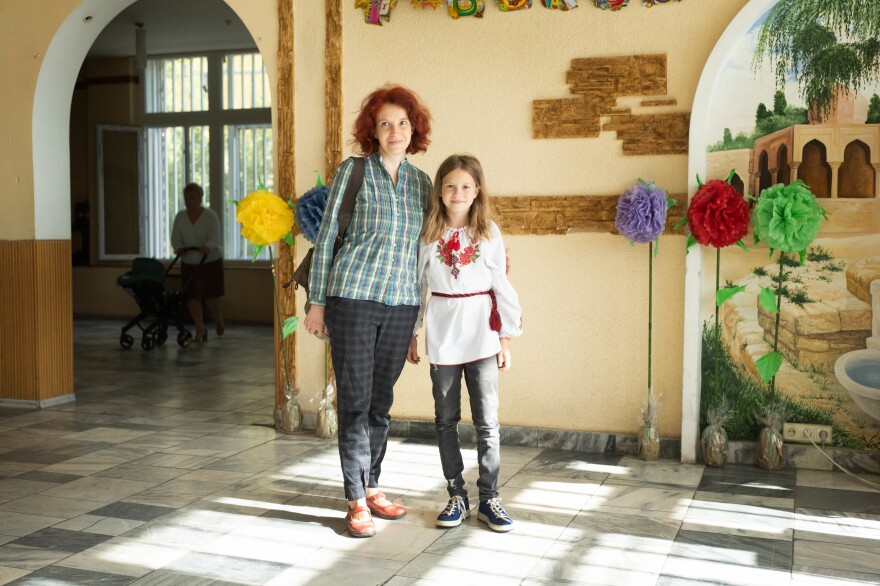
Nearly 4 million students returned to school in Ukraine this month, despite the war. The majority will do some form of online learning – in some cases, it's because the school has been destroyed by bombs or is too close to the fighting. Schools offering in-person learning are required to have adequate bomb shelters. One thing remains true for all Ukrainian school children: as the war rages on, they're dealing with a lot of trauma. And their teachers are determined to provide support.

"It's the destruction of childhood." Schools continue to be targeted by Russian attacks
Two days before the start of the school year, kindergarten staff in Kharkiv were hard at work cleaning and preparing their brightly-painted school in the center of the city. No students would be arriving — in Ukraine's second largest city, the state-run schools are all online. But the staff wanted to make sure the school was tidy and ready. If the war ended tomorrow, they wanted the toys, the books, the little naptime beds with stuffed animals to be ready to welcome the children.

On that day in late August, two teacher assistants stepped outside to take out the trash when the kindergarten was rocked by an explosion. The shelling damaged classrooms and shattered school windows. The two teacher assistants were badly injured in the blast. They're now both in the hospital, undergoing multiple surgeries. The cheerfully-painted multicolor steps they were standing on collapsed, and their blood still stains the concrete.
"I was scared, but now I'm angry," says Yana Tsyhanenko, the head of school, who was in another part of the building during the attack. "It reaffirmed that we must do school online."
Since the Russian invasion in February, 2,177 education facilities have been damaged, and 284 have been destroyed, according to the Ministry of Education and Science. A new report from Save the Children, a U.S-based humanitarian organization, found an average of four preschools a day have been damaged or destroyed in the war in Ukraine.
It's especially stark in Kharkiv, where more than 40 schools have been damaged by shelling, according to an analysis by the Centre for Information Resilience. Other estimates, including one from the mayor of the city, put that number closer to 100.

Even for schools that are intact, the daily missile attacks and shelling in Kharkiv make offering safe, in-person learning a major challenge. With its proximity to Russia, there are often only a few minutes between the air raid sirens and an explosion. Even if a school had a shelter, there wouldn't be enough time to get children down there.
The day after the shelling at the kindergarten, brightly colored children's toys still poked out from the rubble of the damaged kindergarten classrooms and outdoor play area. City workers fashioned wood boards over the broken windows. They cleared out the shards of glass that blasted through classrooms, onto the bookshelves, cubbies and beds.
"It's not the destruction of the building that makes me emotional," Tsyhanenko says, "It's the destruction of childhood."
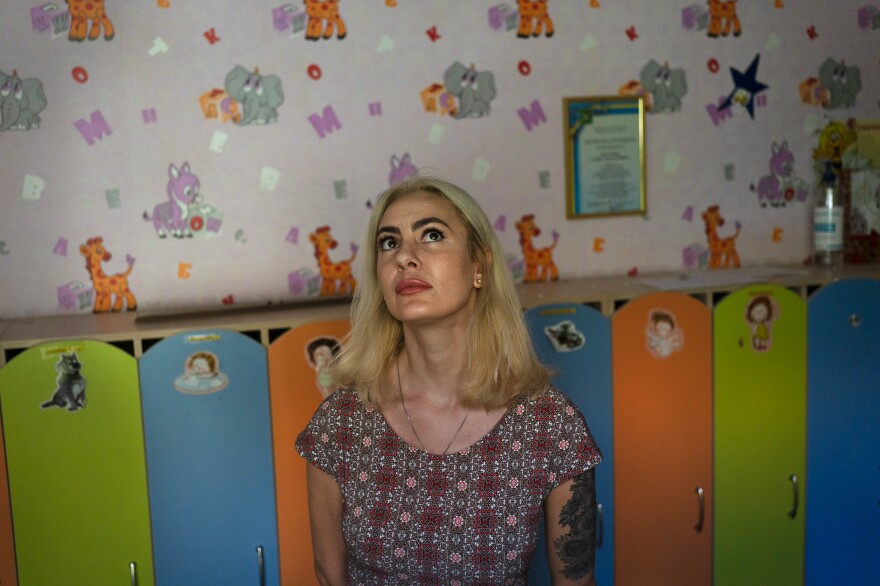
Before the war, the kindergarten served about 350 students, but now only 14 families remain in Kharkiv. The other families moved to other parts of Ukraine or abroad, but the school is still supporting its students with access to teachers, video lessons and suggestions for parents.
With all that turmoil, Tsyhanenko is worried about her students' mental health. The academics — the math and writing — they'll be able to catch up on, it's the emotional development they'll miss most. And without the safety of school and the comfort of the teachers, students and families are on their own.
"Kindergartens are not supposed to be empty," she says, walking down the brightly painted corridor. "They should be filled with laughter, with the sound of little feet running down the hallway." Every day since the attack, she's come back to the kindergarten, cleaning up the broken glass, and making sure the school remains ready for the children. She promised them she'd reopen, that the school would be there when it was safe enough to come back.

For teachers in schools without bomb shelters, online learning is the only option
Even in parts of the country further from the frontlines, most days don't pass without an air raid siren. Without adequate bomb shelters, schools remain closed for in-person classes.
At a secondary school in the east-central city of Dnipro, the halls are abuzz with the excitement of a new year, despite having no students. Teachers are in their classrooms, many freshly decorated, teaching their live video lessons from their rooms.

On the first floor, Anastacia Volkovynska stands at the front of her first-grade classroom with a computer open on a podium in front of her. She gives her online lesson in front of the chalkboard, which is decorated with letters that spell out "first time to the first grade." Her students may not see her sparkly red high heels on their computer screens, but they certainly catch her enthusiastic personality glittering across the screen.
She calls her students her "little kittens" as the 6-year-olds introduce themselves to the class and share their interests. "I like cats," one girl says.
"Marvelous!" exclaims Volkovynska.

A few doors down, a third-grade teacher tells her online class, "I'm going to play a song, and you have to guess it." As soon as the Ukrainian national anthem starts, Olha Chudnivetz's students join her in singing along.
"We're sad everything is this way," says Olha Morhon, the head of school, "but we won't be discouraged. Our main task is to show the children that we are here and we will persist."
That's especially important because students displaced by violence in other areas of Ukraine, like Kharkiv and Luhansk, have relocated to this city. The school's enrollment is actually up, despite being virtual. Across the country, nearly 90,000 students are internally displaced starting the school year at new schools, according to Yuriy Konenko, who heads the country's office for secondary and preschool education. About half a million students are continuing their schooling from abroad.
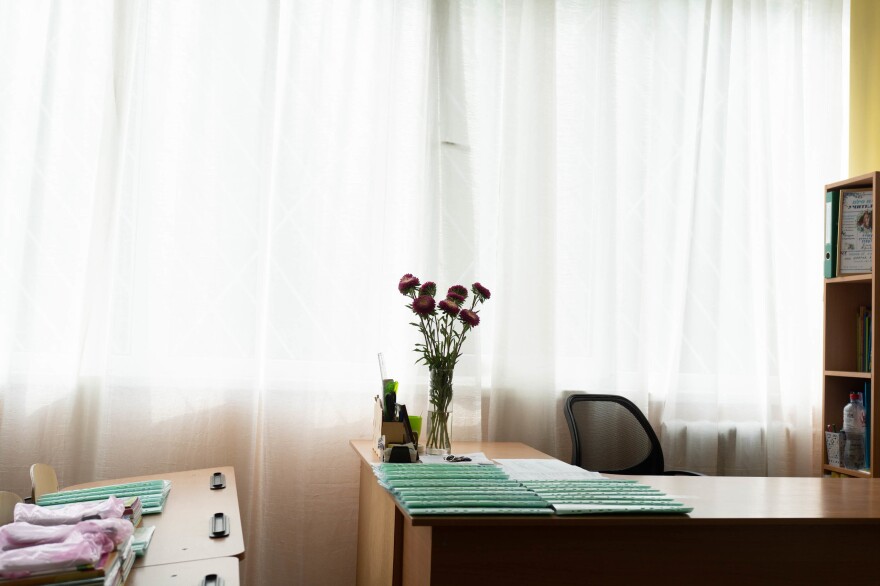
"It's better than nothing." Online school poses challenges for families
Across town, on the 6th floor of a Dnipro apartment building, Vera Sheremet, 10, is sitting at the desk in her bedroom, her computer open to her online art class. The teacher calls on her and she un-mutes just as her little brother, Boris, runs past, screaming. Vera slams her door to keep the noises he generates out of her room.

It's a scene familiar to anyone who dealt with remote schooling during the pandemic, including Vera and her family, except that this time, schools are closed because there isn't an adequate bomb shelter.
"I wanted to meet my teachers in person and I was really hoping that we'd go to school," Vera says when she's on a break between classes. "Online school isn't better. You don't get to meet your friends, you can't run around in the backyard of the school. You don't have normal."
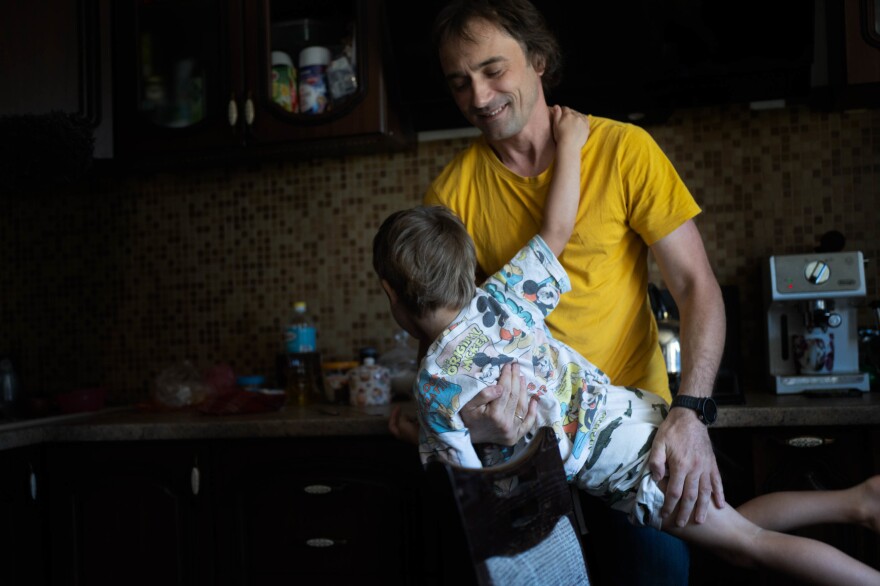
Her parents, Serhii and Svitlana Sheremet, are also not thrilled about school being online and they wish their city had invested more time and money into making adequate shelters for the schools.
"This is, I don't know ..." Serhii trails off. "It's better than nothing."
"I think that education in-person would be better for my children," says Svitlana. They researched private schools in the area, a handful of which are in-person, but because the programs are in-demand, the costs have gone up.
They've also thought about leaving Ukraine. "The world is becoming more and more peaceful if we go to other countries," says Svitlana. "Even Vera, she is dreaming about England or the U.S. for education. She wants to see the world."

For now, the family is staying in Ukraine. Svitlana is a doctor, and she feels her purpose is to stay and help at the hospital. She tells us she feels her taxes help the war effort, help her country.
But there are moments when she falters. Sometimes the internet cuts out during Vera's class. During our visit, an air raid siren goes off. Svitlana says this happens frequently, interrupting class. "Let's go to the safety place," she calls down the hall to the kids.
"Here at home is the same danger as there is at school," she says, as she corrals the kids into the front storage closet they've repurposed as a shelter, with pillows, blankets and stuffed animals. "If schools had a great bomb shelter it would probably be more safe than at home. That's why I'm two hands up for in-person school."
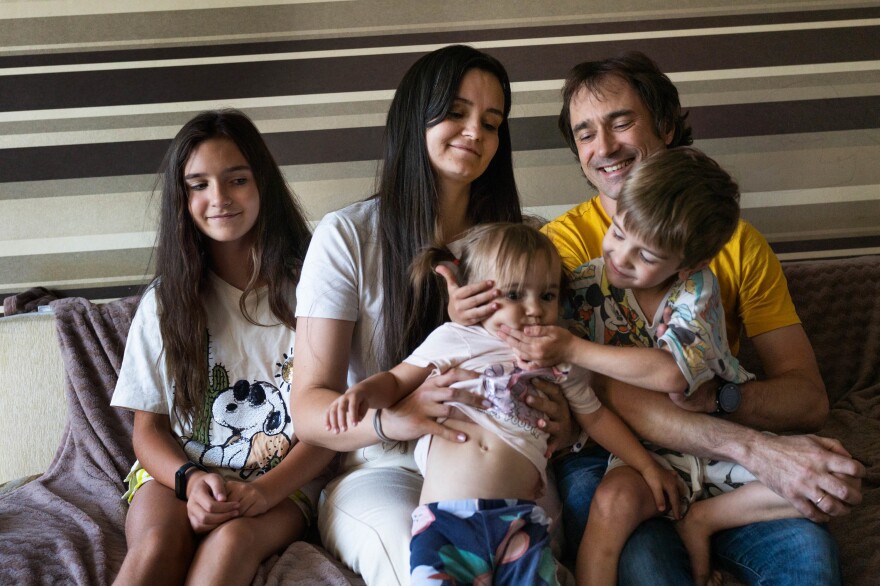
Teaching children how to act during an attack or an air raid siren
At a community center in Kharkiv, senior police officer Dmytro Klymenko is standing in front of a whiteboard, instructing 9- and 10-year-olds how to stay safe during the war. He's introducing the topic of the two-wall rule. He draws a diagram on the board, with a circle to represent an explosion on one side, two lines for the two walls in the middle and a stick figure on the other side.
"The first wall will take the explosion," he tells the kids. "The second wall will get the debris from the first wall."

Most students have heard this information before. They know the answer when Klymenko asks what they'll do if a stranger approaches them (tell their mom, tell their teacher) and they know what belongings they should have in their bags when they go to the bomb shelter (their documents, a flashlight, a snack and a power bank to charge a phone).
Across the country, conversations like these are happening in schools and youth organizations. A new initiative from the Ministry of Internal Affairs in Ukraine is sending nearly two dozen security specialists to help students understand how to shelter properly and deal with explosive objects.

In the classroom in Kharkiv, 9-year-old Sasha Zhuravliov is listening to Klymenko intently. He says hates when things are out of order, and lately, with the war, a lot of things have been out of order. "This makes me really uncomfortable," Sasha says. What does he do when he feels this way? "I take three deep breaths and then three normal breaths," he says, just like his dad taught him when the war started. He says the breathing technique has been helping.

Experts say nearly all of Ukraine's more than 5 million children have experienced trauma
Sasha isn't alone. Experts say that nearly all of Ukraine's children have experienced trauma. Since Russia's invasion in February, children have been displaced from their homes, lost loved ones, witnessed violence and in some cases, experienced it firsthand.
The biggest challenge for Ukrainian educators in the coming months won't be academic — it will be in recognizing the effects of trauma and helping children work through it. Doing that virtually — makes it even harder.
Sasha, Vera and several other children told us that even if their teachers or their parents aren't telling them exactly what's going on with the war, they can tell scary things are happening. They say the biggest giveaway at home — is when their parents start to whisper to each other.
Educators in Kharkiv describe children drawing damaged houses in art class, parents say their kids are acting out, are playing more aggressively or are more in need of hugs.
"The trauma of war can present itself in many ways," says Yuliia Luchnikova a school psychologist in Dnipro. "This state-of-being in Ukraine isn't normal."
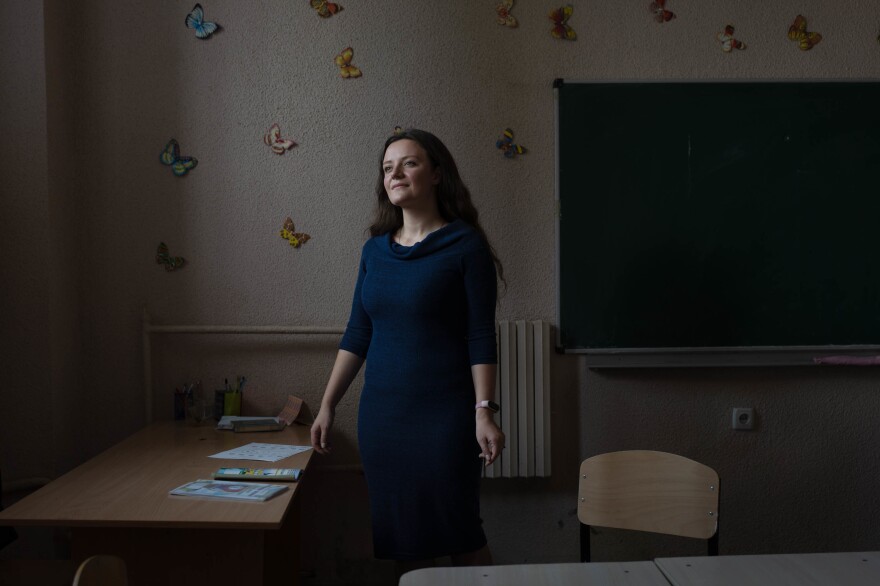
Over the last six months, she's helped families and students navigate anxiety, depression and anorexia stemming from the war. She recommends families have a kind of go-bag with coping strategies for mental trauma.
"You always have your body with you, you always have your mind," she says, "and those are tools to help you where you are." She tells the students she works with that when they are feeling scared or uncomfortable, they can practice tightening and releasing parts of their body one by one, to feel present. They can count their deep breaths to help calm down their bodies.
Public forums where psychologists offer insights on how to deal with the mental trauma of the invasion have sprung up across the country. Many schools offered teacher trainings with psychologists ahead of the new year. Luchnikova did a virtual training with psychologists in Israel, who shared with her their experience of helping children living through a war.

But the longer this war continues, the more the trauma is being prolonged or exacerbated. Children need a sense of safety, a sense of normalcy. Several caregivers remaining in Ukraine, including Vera's parents, told us if things don't improve soon, they'll have to make some big changes. Living like this, with daily fear, is extremely hard for children and their caregivers.
From the makeshift shelter in the center of their apartment, 10-year-old Vera Sheremet says she and her friends don't talk too much about the war because they're scared. "Lots of us have seen stuff blown up right outside our windows," she says. She's never seen it herself, only heard it nearby.

When she feels scared, she watches YouTube videos about people traveling. "I just watch people live a peaceful life, not like this." Vera doesn't try and tell herself she's safe because she knows she's not, but she tries to relax or get lost in a good book.
Her mom, who is listening down the hall, nods. "She's a very smart girl," says Svitlana Sheremet, "this situation is very intense for her. But she's really trying to just be a kid."
Hanna Palamorenko and Polina Lytvynova contributed to this report.
Copyright 2023 NPR. To see more, visit https://www.npr.org.





